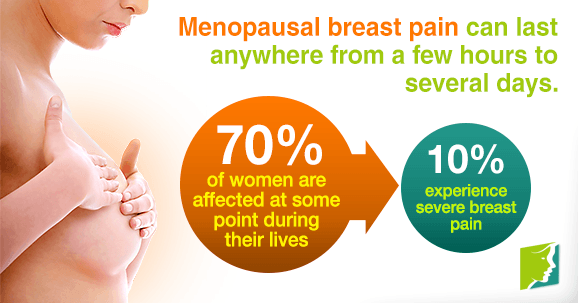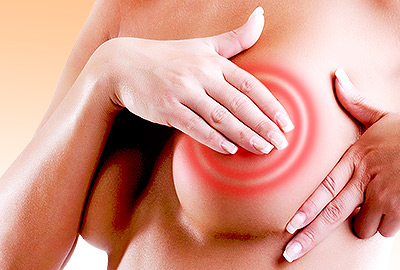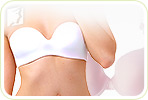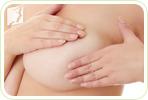Breast pain refers to the general discomfort, tenderness, or pain in one or both breasts. The most common cause of breast tenderness during menopause is hormone fluctuation, specifically of the sex hormones estrogen and progesterone. These hormonal fluxes cause inflammation of breast tissue, resulting in pain. Common symptoms of breast pain include tenderness to touch, sharp stabbing sensation, burning, swelling, and aching. Menopausal breast pain can last anywhere from a few hours to several days at any time during premenopause and perimenopause.
Cyclical and Non-Cyclical Breast Pain
There are two types of breast pain, cyclical and non-cyclical. Cyclical breast pain is the most common one, and it is directly linked to hormonal fluctuations. Women typically experience cyclical breast pain as part of their premenstrual symptoms, and it is also common during pregnancy and perimenopause. Non-cyclical breast pain is persistent and non-hormonal related. It is most common in postmenopausal women. Breast tenderness varies between women, depending on genetics, lifestyle, and estrogen shifts. Keep reading to learn more about the causes and treatment options for breast pain.
Other less common causes:
- Breast cysts
- Breast trauma
- Previous breast surgery
- Stress
- Excessive alcohol consumption
- Oral contraceptive use
- Antidepressants
- Mastitis
- Hormone replacement therapy (HRT)
Managing Menopausal Breast Pain
Breast pain affects up to 70% of women at some point during their lives. Of those 70%, about 10% experience severe breast pain, which can heavily impact daily life, relationships, and activities. There are several ways to help treat and manage breast pain:home remedies, lifestyle changes, and medications.
Lifestyle changes
A few easy lifestyle changes that can help relieve breast tenderness are get plenty of exercise, adequate sleep, avoiding breast pain triggers such as alcohol and caffeine. Thirty minutes of daily exercise five days a week is recommended. Walking, swimming, and yoga are all great alternatives for low-impact aerobic activity.
Getting plenty of sleep is important to improve your overall sense of wellness, as it directly affects how you feel during the day. Lack of sleep can make you more susceptible to breast pain and other ailments. Helpful tips for getting a good night's rest include taking a warm bath before bed, reading, meditating, and listening to relaxing music.
Home remedies
Herbal remedies are a safe and inexpensive alternative to treat breast pain. An herb that has been shown to help relieve this type of pain is chasteberry. Chasteberry has been used for thousands of years for treating premenstrual symptoms, and is still used today to help alleviate menopausal symptoms, specifically breast pain.
Other simple pain relief options are using an ice pack directly to the breast, taking a warm bath, and wearing a soft, supportive bra when doing any kind of activity.
Medical treatments
If breast pain persists, worsens, or becomes intolerable, it may be time to contact your doctor to get some medical relief. Keep in mind, breast pain is typically not a sign of breast cancer. However, it may be helpful to schedule a breast exam to rule out cancer and for some peace of mind. If over the counter medication like ibuprofen or acetaminophen does not alleviate the pain, talk to your doctor about prescription pain medications.
Menopausal breast pain is a part of almost every woman's life, so it is important to keep in mind that breast pain is most likely not a sign of breast cancer, and it is manageable. Trying simple home remedies, making a few lifestyle changes, or seeking medicinal treatments are all ways to help treat and manage menopausal breast pain.
Sources
- National Health Service UK. (2012). Breast pain, cyclical. Retrieved on July 16, 2014 from http://www.nhs.uk/conditions/breastpaincyclical/pages/introduction.aspx
- University of Maryland Medical Center. (2012). Breast pain. Retrieved on July 16, 2014 from http://umm.edu/health/medical/ency/articles/breast-pain




